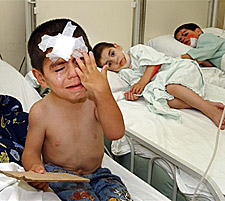A special report from Motor Mission reporter Julian Price. As Israel and Hezbollah tear at each other’s throats, he uses his grass roots contacts in Lebanon to consider if the world is witnessing the beginning of a conflict that is destined to deepen with time.
 The resurgence in the Israel/Lebanon conflict has again brought to the front page of evey newspaper a name that has been synonymous with decades of violent struggle between these two countries - Hezbollah.
The resurgence in the Israel/Lebanon conflict has again brought to the front page of evey newspaper a name that has been synonymous with decades of violent struggle between these two countries - Hezbollah.
My very first day in Lebanon I was introduced to Hezbollah. I asked an acquaintence what the yellow and green flags I could see draped outside many a window stood for. I was told, “These are Hezbollah flags - the saviours of Lebanon.”
When Israel eventually pulled out of Lebanon in 2000, the general consensus was that it had been Hezbollah’s unrelenting resistance to the occupation that had led to the departure. This feat saw Hezbollah ascend to the headiest heights of public esteem. It was much lauded for taking action in the face of the Lebanese government’s weak response to the occupation. Hassan Nazrallah captured the hearts of the common people by apparently returning to them what Israel had held for so long - their Lebanon.
Hezbollah’s actions are supported even more vociferously by the approximately 400,000 Palestinian refugees living in Lebanon who have precious little else to hope in. They consider themselves a nation displaced by the Israeli occupation of their land. Hezbollah is seen as the only organisation capable of withstanding or even overcoming the might of a Western-backed Israel. They represent these refugees’ final hope of returning to their homeland. For this reason the Palestinian camps in Beirut and Southern Lebanon are characterised by staunch support for Hezbollah and the centre for much of their activity. They are able to live and operate in these areas because of the support of the local citizens.
The Radjivs* are a poor Lebanese family that live in the Palestinian refugee camp in Harat Hreik in Southern Lebanon. They moved here to escape Beirut’s high cost of living and had built a peaceful home among the Palestinian refugees that live there. Their children play together on the streets and go to the same school. The father Yusef drives an ancient Peugeot taxi to support his substantial family. The oldest son Ali, still in his teens, is a police officer. His five younger brothers are still at school and worship their brother. They stand in awe as he opens the cupboard to reveal the Kalashnikov that sits there, the magazine always loaded in case peril strikes. A Hezbollah flag flys from the balcony of their sixth story apartment for all the street to see.
The Radjiv family see Hezbollah not as a rogue group but the only organisation that really cares for Lebanon’s citizens to fight and die for them. This resonates with a family that would defend their home with any means they had. Ali is more than willing to use his Kalashnikov to kill anyone who threatens the security of this typically close family. When I dared to suggest that Hezbollah had possibly been involved in acts of terrorism I was met with looks of absolute disbelief.
All actions by Hezbollah are seen as acts of resistance. The killing of 241 US marines in 1983, the suspected kidnapping and killing of US journalists - these actions are seen as justifiable acts of resistance directed towards a western nation that openly contributes to Israel’s ability to make war.
Even though Israel pulled out of Lebanon in 2000, in the eyes of many the war has never stopped, merely moved out of the public spotlight. The capturing of Israeli soldiers by Hezbollah militants on July 12 merely turned the lights back on. But ask anyone in Southern Lebanon if this was an unnecessary action and they would most likely list the Lebanese POWs in Israel, the continued occupation of a piece of land that their nation claims as its own and the continued antagonism by Israeli forces on country’s southern border, including frequent fly-overs by Israeli jets, and Israel’s suspected involvement in ‘terrorist’ bombings inside their cities.
Israel has vowed to continue to fight until it has crushed the threat of Hezbollah. What it may well have underestimated is Hezbollah’s far-reaching support amongst the Lebanese people. The eradication of Hezbollah would literally require the eradication of the Lebanese and Palestinian people living in and around their facilities. Such is the ferocious loyalty to the party that many see it as the only thing standing between them and the potential conquest of Lebanon.
If Israel is serious about the destruction of Hezbollah then this conflict is unlikely to end in the near future. While the Lebanese are still alive, for the greater part they’d rather die than let their beloved land fall under the sway of their most hated enemy.
Julian Price
Sydney Anglicans Foreign Correspondent
* Not their real names
Photos courtesy Arabist
EDITOR’S WARNING: This photo-stream contains graphic content deemed to be extremely disturbing























